The longer the Voice campaign goes on, and as more and more Australians say ‘No’, it’s obvious Prime Minister Albanese’s mission to enshrine the Voice in the constitution bears all the characteristics of the Brexit campaign to decide whether the United Kingdom should stay or pull out of the European Union.
One of the defining characteristics of the Brexit referendum was the split between the London elites committed to staying in Europe and the mass of ordinary voters eager to regain independence and leave.
On one side of the Brexit debate were the large corporations, highly educated professional class, Prime Minister David Cameron, and much of the media. British author David Goodhart described this group as the Anywheres.
Anywheres were Woke in outlook, cosmopolitan, and dismissive of any who failed to conform to their transnational ideology and way of life. In opposition to the Anywheres were those less educated and less privileged. They were people who had have a strong sense of patriotism and commitment to family and place.
Goodhart described this group as the Somewheres and characterised them as conservative and suspicious of government intrusion into their lives. What was most surprising about the Brexit vote was that the Somewheres, even though derided by the elites, won the vote and the UK left the European Union.
Since the start of the campaign to enshrine the Voice in the Constitution, the same division is playing out in Australia. Those arguing ‘Yes’ to the Voice, on the whole, are the elites, big corporations, well-educated, along with the privileged class.
Qantas, BHP, NAB, Fortescue Metals, Telstra, Westpac, and Woolworths are just some of the companies committed to the ‘Yes’ vote. Sporting bodies including the AFL, NRL, Netball Australia, and Cricket Australia have also decided to support Albanese’s campaign.
Research shows it’s those with a tertiary degree, compared to those less educated, who are more willing to vote ‘Yes’. Professional bodies, including the Victorian and NSW Bar Associations plus the Australian Education Union, have also publicly committed to the ‘Yes’ campaign.
Those voting ‘No’, on the other hand, are average citizens, less Woke, and more concerned about family and financial security at a time of economic hardship. For many Australians rising interest rates, the cost of basics including petrol, food and gas, along with electricity prices are straining household budgets to the limit.
While the Canberra elites, Greens, and Teals are consumed by the campaign to give Indigenous Australians a direct line to executive government, the Howard battlers are more concerned with the harsh realities of everyday life.
Roger Scruton in his book Where We Are defines the political challenge of our time as the question of identity. When analysing why Prime Minister David Cameron lost the Brexit vote, Scruton argues most voters were more concerned about the bonds that hold the nation together and that provide a common purpose.
Underlying the increasing ‘No’ vote in Australia is a similar concern among voters that political elites and those in positions of power and influence ignore the essential human need to belong and to find a common purpose and meaning.
Instead, Australians face an incessant Woke narrative that the arrival of the First Fleet in 1788 was an invasion leading to genocide, that society is structurally racist and that anyone daring to say ‘No’ to the Voice is either stupid or prejudiced.
The school curriculum teaches a black armband view of history where Western Civilisation is condemned as oppressive and exploitive. We are subjected to obsequious Welcome to Country ceremonies that treat us as strangers in our own land and even new arrivals are decried as complicit in the sins of the past.
What Scruton terms a growing ‘culture of repudiation’ pushed by those who believe they know better and who define themselves as the nation’s moral guardians is widespread. Not unexpectedly, more and more Australians are saying enough is enough.
Add the fact governments waste billions of hard-earned taxpayer funds on grandiose, senseless schemes like pushing water uphill to have it flow done again and so many politicians are consumed by self-entitlement and no wonder political trust is in short supply.
Proven by the defeat of the Scott Morrison government at the last federal election, it’s clear the political pendulum swung to left-of-centre and Anthony Albanese’s promise to seek reconciliation, address global warming and embrace Woke ideology was a winner.
Demonstrated by the number of Australians saying ‘No’ to the voice and the fact more parents are pushing back against neo-Marxist-inspired gender fluidity theory, where children are taught boys can be girls and girls can be boys, the pendulum is moving back to the centre. The Albanese government cannot assume the next election will be an easy one to win.
Dr Kevin Donnelly is a senior fellow at the ACU’s PM Glynn Institute and editor of Cancel Culture and the Left’s Long March.

























